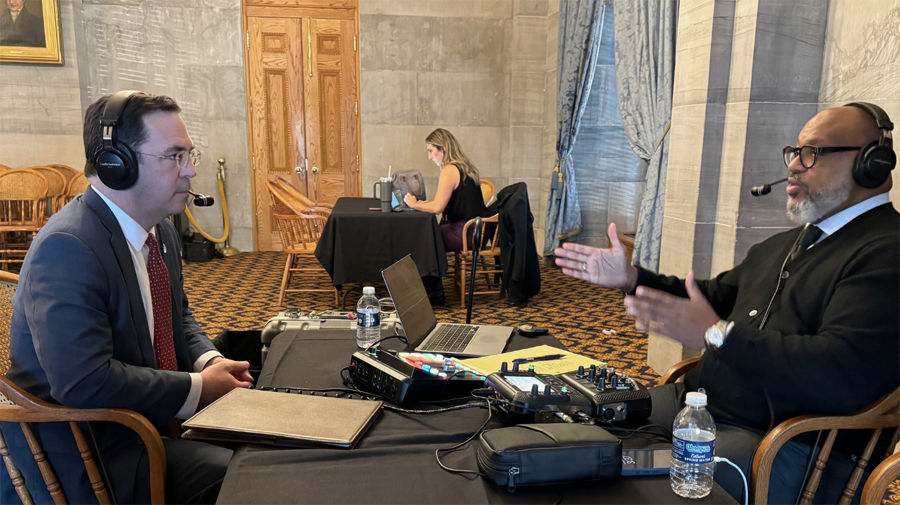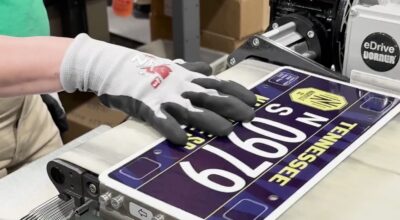
Commissioner of revenue David Gerregano, left, gives an interview to a radio reporter in Nashville. (Photo DOR)
Since May 2023 the “gnomes” and I have been reading the law in Tennessee as relates to “financial responsibility” and the law that everyone has said for more than two decades is “mandatory motor vehicle insurance.”
Well, it’s not true. Tennessee is not a manatory insurance state. A bill by Soddy-Daisy state Rep. Arnold Stulce to make it one was defeated in 1999.
What the general assembly rejects cannot, as a matter of law, be put into operation administratively. That is exactly what happened under a trick supported by the attorney general and legislators who tinkered with provisions in T.C.A. §55-12-139. Adding the phrase “This part shall apply to every vehicle subject to the registration and certificate of title provisions” does not — and legally cannot — replace a full rewrite of the statute. Adding a phrase like that is a shortcut that maroons and abrogates many parts of the law that are structural.

Ed Soloe of Alcoa, Tenn., a feral handyman and mechanic, is a drudge like the other “gnomes” who read the plain provisions of the Tennessee financial responsibility law of 1977. In 2023 he called this reporter at Eagle Radio Network and put him onto a majo story no fogbomber media outlet is covering. With Mr. Soloe’s help, I am filing a third lawsuit to hurl a javelin at the Eye of Sauron. (Photo David Tulis)
These contradictions caught the attention of Alcoa, Tenn., handyman and mechanic Ed Soloe, who is the “Gnome Librarian” with a great eye or detaill and long hours for reading, as he lacks an employment.
That phrase is limited in its meaning by many other parts of the law, and cannot of itself wide the scope of applicability of the financial responsibility requirement.
QUICK TAKE ————————
— Only certified motor vehicle liability insurance policies can be required
— Only people under suspension can get a certified policy
Bureaucrats in early 2000s, in other words, opted for a workaround, with a cooperative general assembly, and rewrote the law. Not junking or deleting many other provisions gives them away, as do the rules of statutory construction.
The biggest rule of statutory construction DOR and department of safety violate is ejusdem generis, that “where general words follow special words, which limit the scope of a statute, these general words will be construed ordinarily as applying to things of the same kind or class as those indicated by the preceding special words. State v. Wheeler, 127 Tenn. 58, 152 S. W. 1037. This rule is one of frequent application, and is a valuable aid in the construction of statutes.” State v. Grosvenor, 149 Tenn. 158, 258 S.W. 140 (1924).
What follows is a summary of the whole controversy in layman’s terms.
The hidden secret of state-based scam
Tennessee’s mandatory insurance law operates upon the traveling and shipping public. The question is as to noncommercial motorists whether it is mandatory on 100 percent of registered “private passenger motor vehicles” or only upon a tiny number of vehicle owners, people who violated the Tennessee financial responsibility law obligation after a qualifying crash, T.C.A. § 55-12-104, or ignored a court judgment or an agreement or conditional use of the privilege and who bind themselves to have insurance as a condition of the privilege.
Commissioner Gerregano makes insurance compulsory on all. By departmental custom or usage he uses T.C.A. § 55-12-139 and the Atwood law at § 55-12-201 et seq to create an independent mandatory motor vehicle insurance scheme that the Tennessee financial responsibility law of 1977 at § 55-12-101 et seq flatly contradicts. His scheme is oppressive, a rewrite of state law.
The department of safety and homeland security (“DOSHS” or “safety”) gets the primary role of administering financial responsibility. It initiates all enforcement of Tennessee financial responsibility law of 1977, Parts 1 & 2. The general assembly gives administration of “Part 2. Insurance Verification Program (James Lee Atwood Jr. Law),” (“Atwood”) to department of revenue (“revenue” or “DOR”). Part 2’s purpose is narrow, technical: To create and run a utility to oversee an “insurance verification program,” Sect. 202 (emphasis added). DOR enforces the requirement initiated by DOSHS.
Atwood ordains DOR to “develop and implement an efficient insurance verification program” using corporate insurers’ databases, but only when a motor vehicle liability policy is used for POFR. The verification of coverage is needed to determine whether a vehicle owner under duty to have insurance coverage in Part 1 is actually covered. And to confirm that fact in the blink of an eye using the Internet. Part 1 requires certain registrants to have POFR as a condition precedent to the reinstatement of the driving privilege after revocation for an unsatisfied judgment or breach of the TFRL.
0.0473% of all vehicle owners to 100%
Respondent pretends that starting Jan. 1, 2017, its new authority to mine insurance partners’ customer data allows it to execute what it claims is a pre-existing authority for a “general obligation to maintain some form of financial responsibility” under sect. 139. DOR instantly expanded its role from monitoring roughly 3,000 people under lawful privilege probation to 6.34 million registrants, from 0.0473 percent of all vehicle owners to 100 percent, each vehicle owner treated as an irresponsible driver under chastisement, suspension and conditional use without due process.
Law contradicts respondent policy. In administering the chapter, safety leads and revenue follows. By law, DOR receives notice from department of safety to revoke or suspend registrations of people who have been involved in a qualifying accident at § 55-12-104 and -105 and yet who fail to prove financial responsibility. Safety pulls the trigger. Respondent has a responsive and step-and-fetch-it secondary role. “[I]mmediately upon request by the commissioner of safety, the commissioner of revenue shall issue a notice of suspension of the registration of the motor vehicle” of one who fails to make good after a finding of irresponsibility by safety or a court judgment” § 55-12-104.
Atwood’s electronic insurance verification system allows the department to continually verify proof of motor vehicle liability policies from high-risk irresponsible drivers and operators subject to supervision of safety and revenue for violating T.C.A. § 55-12-105 or other laws such as DUI. Such people are flagged, and recorded, before any encounter with an officer, via safety’s Financial Responsibility Division.
According to § 55-12-209(b) “The department of safety shall cooperate with the department of revenue in developing, implementing, and maintaining the program.” Yet as shown during deposition, DOR has not worked with DOSHS. If an automobile liability insurer chooses not to utilize the Insurance Industry Committee on Motor Vehicle Administration (“IICMVA”) model, insurance companies provide monthly updates of customer lists viewable by revenue. Atwood allows deputies and police officers alongside roads to then verify motor vehicle liability policies “as required” from those subject, on record, to state supervision requirements under TFRL. Such parties are under administrative probation or conditional reinstatement of the driving and operating privilege. § 139(b)(1)(a).
No qualifying accident, not bound by law
Relator has not had a sect. 104 qualifying accident in the 1999 Toyota RAV4. He falls under exemption at sect. 106(13). Yet, arbitrarily and capriciously, DOR says sect. 139 “[imposes] the mandatory requirement to obtain financial responsibility regardless of whether an accident occurred.” DOSHS acts upon the law in like manner.
Tennessee is a mandatory insurance state for those required to have insurance as condition of keeping or restoring license and tag. Revenue has stated that petitioner has two alternative options if he doesn’t purchase insurance. (1) He can either make a $65,000 “cash deposit” with revenue to use the public road to exercise his private and his commerce rights, or, (2) he can secure a corporate surety bond on his otherwise uninsured personal-use car or motor vehicle. The commissioner of revenue has no authority to make such demand, nor to collect, bank nor disburse such money. Relator with an excellent driving record, finds no corporate surety bond available. Cash payments under TFRL are remitted to safety. § 55-12-105(b)(2) and § 55-12-102(12)(A-D)
DOR effectively coerces all registered owners to become customers of the for-profit insurance-industrial complex and companies such as State Farm.
Court cases are clear that respondent’s theory about Parts 1 and 2 are fraudulent. TFRL is an “after-accident” and “voluntary insurance” law. Owners of motor vehicles can buy insurance — or not. An accident-free motorist “is at liberty to own and operate a motor vehicle without any insurance coverage or with as little insurance coverage as desired.” McManus v. State Farm Mut. Auto. Ins. Co., 225 Tenn. at 109, 463 S.W.2d at 703. TFRL in Part 1 nowhere requires relator to show proof of financial security or financial responsibility absent a qualifying wreck, a court judgment or conviction, or a safety order.
Atwood in Part 2 does not alter the nature of the law or state policy. Atwood is not a “proof of financial security required at all times of all people” law. In fact, Atwood unequivocally states at Sect. 214, “[n]othing in this part shall alter the existing financial responsibility requirements in this chapter.”
Respondent’s assertions such as “Tennessee like most all states requires proof of insurance for all vehicles plated and used on public roads,” are false, either as (1) plain error, as (2) incompetence, or as (3) outright lying about civilly and criminally actionable harms, knowing and intentional acts of official misconduct, oppression under color of law, and denial of honest government services.


“Tennessee is a mandatory insurance state for those required to have insurance as condition of keeping or restoring license and tag.”
Of course, the presumption of the ruling class is that “you” are “those required.”